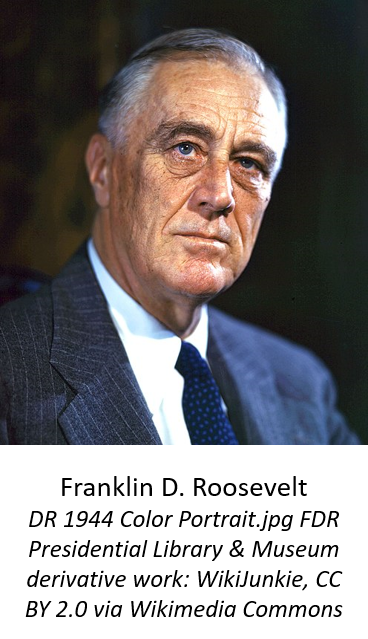The Sixth Edition and Acceleration of Social Reconstruction in American Schools
Recall that J.E. Morgan, long-time NEA Journal editor and editor of the original American Citizens Handbook copyrighted to the NEA, also edited the sixth edition of the Handbook that was copyrighted to the NCSS. Harold Ordway Rugg, a member of the faculty at Teachers College, Columbia University, is recognized as one of the “Founding Fathers of the National Council for the Social Studies” which early on became a department of the NEA.51 Rugg was influenced by Fabian Society ideas and promoted “progress” toward America’s social reconstruction and a planned economy. Similar Progressive ideas are seeded in the content of the sixth edition through entries titled “Democracy as a Great Social Faith” and President Franklin D. Roosevelt’s “Four Freedoms,” in addition to the previously included section on the United Nations.
 Writing during the Great Depression (1929-1939), Rugg believed that the American economy was flawed because it was “utterly undersigned and uncontrolled.” According to a 1941 TIME magazine article, his awakening began on Jan.1, 1920 when he went to Teachers College's new, progressive Lincoln School. Rugg encountered the Fabian Society and Progressive thought leaders on the Columbia faculty including John Dewey. Rugg decided to organize a Teachers College group famously known as Frontier Thinkers. The group held bimonthly discussions on "reconstructing" U. S. education and teaching teachers a new jargon.52
Writing during the Great Depression (1929-1939), Rugg believed that the American economy was flawed because it was “utterly undersigned and uncontrolled.” According to a 1941 TIME magazine article, his awakening began on Jan.1, 1920 when he went to Teachers College's new, progressive Lincoln School. Rugg encountered the Fabian Society and Progressive thought leaders on the Columbia faculty including John Dewey. Rugg decided to organize a Teachers College group famously known as Frontier Thinkers. The group held bimonthly discussions on "reconstructing" U. S. education and teaching teachers a new jargon.52
The name Frontier Thinkers was likely a nod to Fabian socialist Henry A. Wallace’s book New Frontiers.53, 54 Wallace said that Americans must abandon the frugality, competitive spirit, and individualism of the Old Frontier, where men, whether Protestant or Catholic, accepted implicitly the Protestant work ethic. In the 1990s, Diversity, Equity, and Inclusion consultant Judith Katz disparaged individualism and the Protestant work ethic in a chart entitled “Some Aspects and Assumptions of White Culture in the United States.”55 Her chart was stylized as a poster on the Smithsonian National Museum of African American History and Culture’s website, but was removed in 2020 after vigorous public criticism.56
In his book The Great Technology, Social Chaos and the Public Mind (1933), Rugg called for the “social reconstruction” and “scientific design” of the economy in order to teach “acceptable values” and improve the mental health of Americans.57 Rugg proposed,
- “...through schools of the world we shall disseminate a new conception of government — one that will embrace all of the collective activities of men; one that will postulate the need for scientific control and operation of economic activities in the interests of all people; and one that will successfully adjust the psychological relations among men. Political government in a new connotation, then, including economic government and social government” (emphasis added). (p. 271)
- A new public mind is to be created. How? Only by creating tens of millions of new individual minds and wielding them into a new social mind. Old stereotypes which lack foundation in scientifically established facts and in driving humane attitudes must be uprooted. New ones ... must be erected in their place. But this is the task of education ... The postulate follows that the economic system can be operated efficiently and humanely only by the elimination re-education and assignment to productive work of the parasitical members of this group of middlemen. (p.179)
Rugg proposed what contemporary leaders in education refer to as acceptable “attitudes, values, and mindsets.” He proposed “new materials of instruction” and produced the first-ever series of school textbooks from 1929 until the early 1940s.58 In one of his books, An Introduction to Problems of American Culture (1931), a social studies textbook for junior high school students, Rugg pointed to Soviet Russia as an example of the comprehensive government control that America needed.59
 During the 1930s, over five million American students used Rugg’s social studies textbooks. Rugg's advocacy of a planned cooperative economy and society caused the American Legion to campaign against Rugg’s work as un-American.60 Though Rugg’s textbooks fell out of favor and ceased to be published, they were replaced with texts written by like-minded disciples.61 They understood the role of K-12 teachers in bringing about the New World Order. Rugg’s Frontier Thinkers colleague George Counts wrote,
During the 1930s, over five million American students used Rugg’s social studies textbooks. Rugg's advocacy of a planned cooperative economy and society caused the American Legion to campaign against Rugg’s work as un-American.60 Though Rugg’s textbooks fell out of favor and ceased to be published, they were replaced with texts written by like-minded disciples.61 They understood the role of K-12 teachers in bringing about the New World Order. Rugg’s Frontier Thinkers colleague George Counts wrote,
- ...the teachers should deliberately reach for power and then make the most of their conquest...to fashion the curriculum and the procedures of the school they will...influence the social attitudes, [social-emotional learning] ideals and behavior of the coming generation (emphasis added). (pp. 28-29)
- Today we are witnessing the rise of a civilization quite without precedent in human history — a civilization founded on science, technology, and machinery, possessing the most extraordinary power, and rapidly making of the entire world a single great society. (p. 31)
- ...The growth of science and technology has carried us into a new age [of scientism] where ignorance must be replaced by knowledge, competition by cooperation, trust in Providence [biblical worldview] by careful planning [technocracy] and private capitalism by some form of social economy [socialism]. (p. 48)
Counts practiced what he preached. He assumed positions of leadership among the academic elite to steer American education toward socialism. Counts became president of the American Federation of Teachers and a member of the Commission on the Social Studies of the American Historical Association. He was also the first editor of the Progressive journal Social Frontier which advocated enlisting teachers in the reconstruction of society.62
The year after NCSS published the Handbook’s sixth edition, NCSS was no longer a department of the NEA and no subsequent editions were published; however, the implications of the changes to the Handbook from the first to the sixth editions are important because they indicate that the NEA’s long-time commitment and trajectory of the social reconstruction of the United States is aligned to the agenda of the intellectual elite associated with the British Fabian Society.
Footnotes:
Want to be notified of new
Education Reporter content?
Your information will NOT be sold or shared and will ONLY be used to notify you of new content.
Click Here
Return to Home Page
